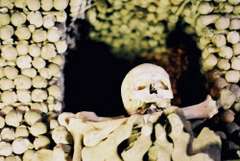Hunting for Digital Heads
 A recruiter recently asked us what they should look for when recruiting someone qualified to do what we do. It’s a challenge, because even for veterans, our work is really only 10 or 15 years old. It’s still relatively rare to find capable communicators who are both web-savvy (in the ways I describe below), and capable marketers.
A recruiter recently asked us what they should look for when recruiting someone qualified to do what we do. It’s a challenge, because even for veterans, our work is really only 10 or 15 years old. It’s still relatively rare to find capable communicators who are both web-savvy (in the ways I describe below), and capable marketers.
If your company has decided to bring a digital strategist or social media professional on board, you’re looking for someone to help you manage your online channels, promote your brand, engage an online community, and help you stand out online. Potential candidates will all have one thing in common: an ability to wear different “online hats” and navigate the web and their work with fresh eyes and enthusiasm for everything digital.
These days, here’s what we’re looking for in terms of online communicators and community managers:
1. A Background in Marketing, Communications and Public Relations
A background in marketing or communications, we think, is pretty essential. So much of social media is about building relationships and a technical background, while great for building and using online tools, doesn’t necessarily give way to online social skills.
Someone with public relations experience will at least understand the importance of nurturing existing relationships and reaching out to new contacts and communities.
2. Why The Ability to Write Still Counts
When it comes down to it, social media and online engagement involves a lot of writing. You’ll want your candidate to have a strong set of writing skills, the ability to meet deadlines and write quickly using proper grammar. Your candidate will most likely be called upon to write in under 140 characters, put together blog posts, reach out to other writers and have a general understanding of how to capture the attention of an online audience. They’ll also have to develop or adopt a voice on behalf of your organization in your online communities and campaigns.
3. Knowing How and What to Measure
Building general awareness and blindly reaching for an online audience isn’t good enough. Here at Capulet, we’ve been invited to work on projects when we were the first to ask the question: “what problem are we trying to solve?” That’s where metrics and knowing what to measure, helps. Ideally, your candidate would be able to crystallize what your project’s online objectives are and set up the proper checks and balances so you can measure them along the way. This could be anywhere from boosting the number of site visitors to online outreach and specific mentions by online influencers. Or maybe it’s about getting the attention of one person or raising enough money during a campaign. Whatever the case, your digital strategist should be able cut out what doesn’t matter and focus on what counts.
4. Storytellers
So much of what we see online centers on storytelling. Videos, blogs, and many online campaigns will often operate within a timeline and a structure that suggests a theme with a beginning, a middle, and an end. The project objective marks what’s at stake and the climax is usually the outcome of your project or campaign. Facebook and Twitter have had an enormous impact on how people interact with online content. Today, an online interaction is defined by how it relates to the viewer personally and how it relates to their own story.
5. Tools and Why You Don’t Need to Worry About Them (Much)
Understanding which online tools can help you and how to use them is probably the least important skill set you need to consider when looking at a potential candidate. It doesn’t hurt to know what’s out there to help manage social media channels, build community, and technically set an organization apart. However, the tools will always change. In a way, it’s the rules that stay the same and how your candidates use their tools (as opposed to what tools they use) to meet project objectives and manage an organization’s online needs is what really counts.
6. What You Love About the Web
Any successful digital strategist or community manager ought to be able to answer these questions:
◦ What do you love on the web?
◦ What does the web love right now?
The first question is really one of taste, and speaks to the kind of work a candidate might do for you. For example, you can ask them what they think about Reddit. This is usually a pretty good indicator as to whether your candidate knows where to search for interesting content online. They don’t have to be an active contributor on Reddit but, at the very least, they should know what it is and why it’s so popular these days.
The second question will tell you whether your candidate is up-to-date on what’s happening online, as opposed to quickly searching sites like TechCrunch and Mashable for “what’s hot.”
Part of what makes our work so interesting here at Capulet is the changing digital landscape. What defines the search for a digital strategist is in constant flux and presents its own set of challenges. But its also what keeps us in the arena: breaking new ground and building remarkable online campaigns. If you decide to take the leap and go hunting for a digital strategist, just consider it a bonus if you fall in love with the web along the way.